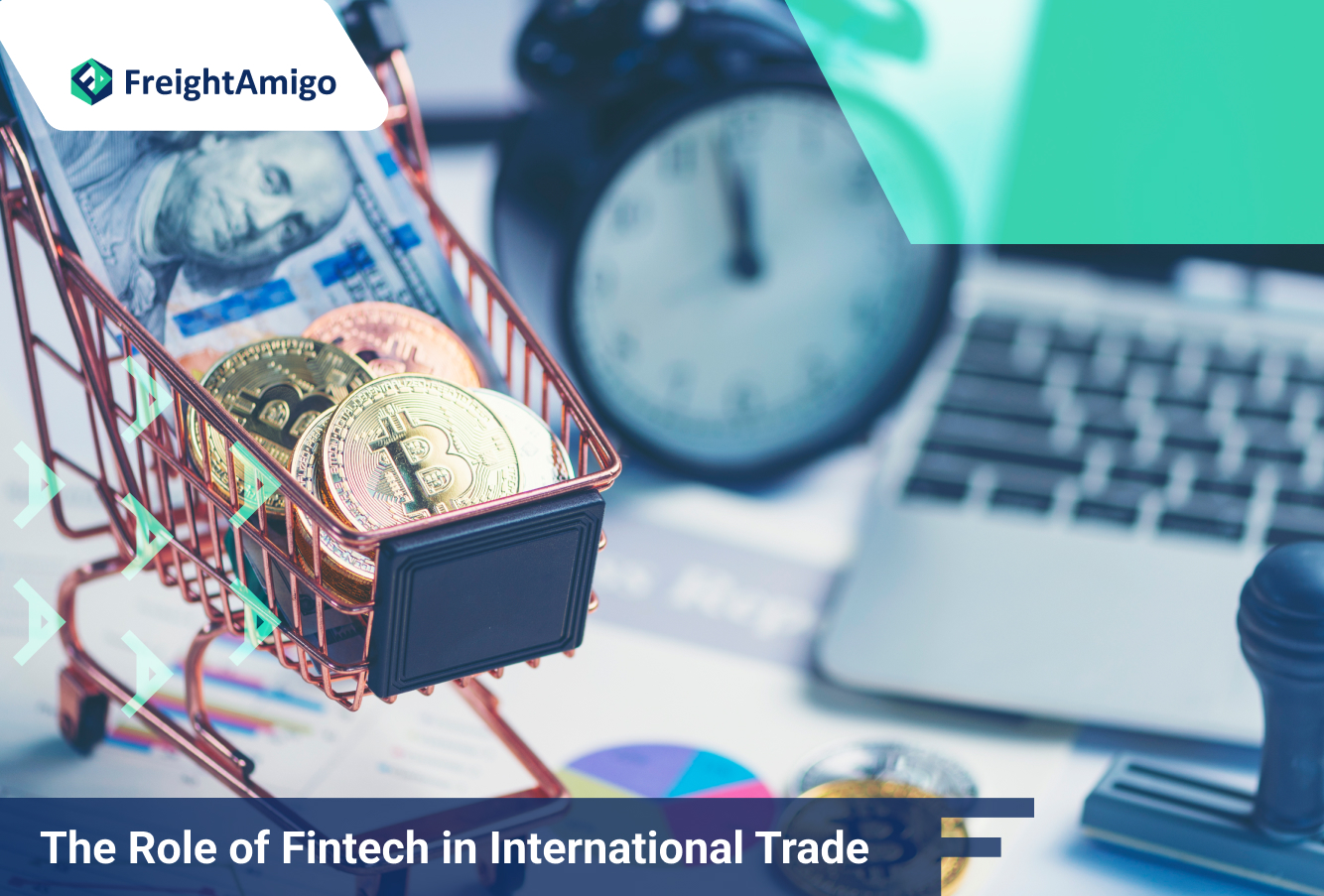Author Name: Tiffany Lee – Marketing Analyst at FreightAmigo
In an era where globalization is the cornerstone of economic growth, the intersection of financial technology (fintech) and international trade represents a pivotal evolution in how businesses engage across borders. Fintech trade, by leveraging groundbreaking technologies, has emerged as a key facilitator of seamless transactions, offering solutions that mitigate traditional barriers and enhance efficiency in logistics and trade processes. This transformation is reshaping the landscape of international trade, enabling a more interconnected and accessible global market. Our exploration of fintech’s role in this domain underscores its significance in driving forward economic integration and fostering a more inclusive financial environment worldwide.
Our article will delve into the transformative impact of fintech on international trade, focusing on how innovations in blockchain technology promise to revolutionize global supply chains by increasing transparency and reducing inefficiencies. We will also discuss the critical role fintech plays in bridging the digital divide, particularly for small and medium-sized enterprises (SMEs) and emerging markets, by providing them with the tools necessary to compete on a global stage. Furthermore, the synergy between fintech and the advent of 5G technologies unveils new horizons for logistic strategies and the execution of international trade. Through this examination, we aim to provide a comprehensive overview of the multifaceted contributions of fintech trade to global commerce, emphasizing both current applications and future potential.
Want To Compare The Best Express, Air Freight, Sea Freight, Rail Freight & Trucking Rates So As To Have Better Control On Cost?
The Transformational Impact of Fintech on International Trade
Introduction to Fintech and Its Relevance
Fintech, a blend of “financial technology,” is revolutionizing how we approach banking and financial services, extending its influence to international trade. By integrating innovative technologies, fintech simplifies and streamlines financial transactions, offering a more efficient and accessible means for conducting business globally. This transformation is particularly relevant today as digital payment systems and blockchain technology begin to dominate the financial landscape, reshaping the traditional methodologies of trade finance.
How Fintech Overcomes Traditional Trade Finance Barriers
- Digital Payment Systems: The advent of digital payment platforms has dramatically lowered the costs and shortened the settlement cycles for international transactions. This evolution not only reduces transaction costs and exchange rate risks for import and export enterprises but also enhances the attractiveness of a country to foreign investors. The resultant effect is a significant boost in the development of international trade.
- Blockchain Technology: Fintech’s foray into blockchain technology offers unprecedented transparency and efficiency in global supply chains. By digitizing and automating customs and border clearance processes, blockchain facilitates a shift towards greater security, verifiability, and paperless processing. This not only alleviates the burdens of manual processing but also markedly improves accuracy and throughput in trade logistics.
- Advanced Encryption and Security Measures: Digital payment platforms employ state-of-the-art encryption technologies and robust authentication measures, ensuring the integrity of transactions and mitigating risks associated with fraud and compliance. This fosters a secure environment for buyers and sellers in the international trade arena.
The Role of Digital Payments in Fostering Global Trade Relations
Digital payments have emerged as a cornerstone for fostering robust international trade relations. By providing a more convenient and efficient mechanism for payment settlement and foreign exchange transactions, digital payments enable countries to attract more foreign investment, thereby propelling the development of their international trade. Furthermore, the ease of cross-border transactions, especially with the advent of cross-border digital payment platforms, has significantly reduced the barriers to fund flows, making international trade more accessible and efficient for a broader range of enterprises.
Blockchain and Its Revolutionary Potential for Global Supply Chains
Understanding Blockchain Technology
Blockchain technology functions like a chain of digital “blocks” that contain records of transactions. Each block is connected to those before and after it, creating an irreversible and unalterable chain. Blockchain’s security comes from its decentralized nature, where a copy of the records is held across multiple nodes, making it nearly impossible to alter fraudulently. This technology is particularly revolutionary in the financial sector, where transaction transparency and security are paramount.
Benefits of Blockchain for Supply Chain Transparency and Efficiency
Blockchain offers transformative benefits for supply chain management. It enhances transparency by providing an immutable ledger visible to all network participants, which reduces the instances of fraud and increases trust. Efficiency is achieved through the streamlining of processes such as procurement, compliance, and quality control. With real-time tracking, businesses can see the movement of goods from origin to delivery, ensuring that all parties are informed of the status and location of products.
Use Cases of Blockchain in Monitoring and Verifying International Transactions
- Provenance Tracking: Blockchain enables detailed tracking of a product’s journey from its source to the consumer. This can prove essential for verifying the authenticity of goods and preventing the sale of counterfeit products.
- Payment Automation: Smart contracts on blockchain can automate payments triggered by supply chain events, such as the delivery of goods, which simplifies transactions and reduces the scope for disputes.
- Regulatory Compliance: By providing a transparent view of all transactions, blockchain can help companies comply with regulatory requirements more efficiently, reducing the risk of penalties and enabling smoother operations across borders.
These applications showcase blockchain’s potential to not only improve individual business processes but also to revolutionize entire industries by enhancing security, transparency, and efficiency.
Bridging the Digital Divide: Fintech’s Role in Supporting SMEs and Emerging Markets
Challenges Faced by SMEs in Accessing Traditional Financial Services
Small and medium enterprises (SMEs) often struggle with the high costs and rigid credit assessments imposed by traditional banks. These institutions typically offer optimized solutions that do not fit the unique needs of SMEs, making securing funding a significant challenge. Additionally, the verification process for onboarding is frequently cited as a major pain point, with many SMEs experiencing difficulties in meeting the stringent requirements set by banks.
Fintech’s Contribution to Financial Inclusion and Support for Emerging Markets
Fintech is revolutionizing the financial landscape by offering tailored financial services that meet the specific needs of SMEs and emerging markets. By leveraging digital platforms, fintech provides solutions like peer-to-peer lending, online crowdfunding, and digital lending platforms that use algorithms for credit assessments. These innovations not only facilitate easier access to finance but also ensure that financial services are more inclusive, supporting the growth of SMEs in underdeveloped regions.
Examples of Fintech Solutions Facilitating Growth and Sustainability in Underdeveloped Regions
- Digital Loans and Crowdfunding: Platforms that offer digital loans and crowdfunding opportunities provide SMEs with the necessary funds without the complexities of traditional banking.
- Mobile and Digital Banking: The rise of mobile and digital banking in regions like Africa enables individuals to access financial services where traditional banking infrastructure is lacking.
- Blockchain Technology: Utilizing blockchain for things like electronic invoicing and tokenized assets helps streamline operations and reduce costs, making it easier for SMEs to manage their finances effectively.
Fintech’s innovative approach not only bridges the gap in financial services but also plays a crucial role in fostering sustainable economic growth in emerging markets.
The Synergy Between Fintech and 5G Technologies
Overview of 5G Technology and Its Implications for Fintech
5G technology, heralding significant advancements over its predecessor 4G, offers transformative capabilities with its higher data rates and reduced latency. The integration of 5G in fintech is set to revolutionize the sector by enhancing the speed and efficiency of financial operations. With up to 10x the data throughput and latency as low as one millisecond, 5G enables real-time financial transactions and seamless user experiences, crucial for modern fintech applications such as high-frequency trading, real-time fraud analysis, and instant payment processing.
How 5G Enhances Fintech Solutions in Trade and Supply Chain Management
The adoption of 5G technology significantly boosts the capabilities of fintech solutions in managing complex supply chains and international trade logistics. By providing a robust infrastructure for mobile edge computing and network slicing, 5G facilitates more efficient data handling and improved operational flexibility. This technology supports the deployment of IoT devices in supply chains, allowing for real-time tracking and management of goods. Additionally, 5G enhances the implementation of blockchain in trade finance, ensuring transactions are secure, transparent, and efficient.
The Future of International Trade with Fintech and 5G Integration
Looking ahead, the synergy between fintech and 5G is poised to redefine international trade landscapes. The enhanced connectivity and capabilities of 5G will enable fintech innovations to drive more inclusive financial participation and extend services to underbanked regions. This integration supports not only faster and more reliable financial transactions but also fosters the development of new fintech solutions that can adapt to the evolving demands of global trade, ultimately leading to more dynamic and resilient economic systems.
Conclusion
Through our exploration of the role of fintech in international trade, we’ve underscored fintech’s transformative impact on global commerce, particularly through innovations in blockchain technology, digital payments, and the seamless integration with 5G technologies. These advancements not only streamline trade processes and enhance efficiency but also play a critical role in bridging the digital divide, offering SMEs and emerging markets the tools needed to compete on a global scale. By facilitating more inclusive financial environments and fostering economic integration, fintech stands as a pivotal force in reshaping the international trade landscape.
Looking ahead, the implications of fintech’s integration into international trade are profound, offering promising avenues for future research and action. As this sector continues to evolve, it will undoubtedly generate further innovations that will deepen financial inclusion and bolster the efficiency of global trade processes. This progression calls for ongoing collaboration between technological innovators, financial institutions, and policymakers to harness the full potential of fintech, ultimately driving toward a more interconnected and economically robust global market.
There Are Different Options For Cargo Transportation. If You Want To Choose The Most Convenient And Suitable Solution, It Is Best To Have The Full Support Of Logistics Experts! If You Are Planning To Ship Goods Overseas, Please Go To The FreightAmigo Page For Inquiries.
===
Read More:
【Cosmetic Product Recycling】 A Guide to Sustainable Reverse Logistics
【Rise of Green Supply Chain】 Pioneering Sustainable Practices in Logistics
【ESG in Logistics】 How ESG Practices Drive Social Responsibility in Logistics
===
If you have any inquiries on logistics/supply chain, feel free to contact FreightAmigo now:
Chat with us online OR
Phone : +852 28121686
WhatsApp: +852 27467829









































